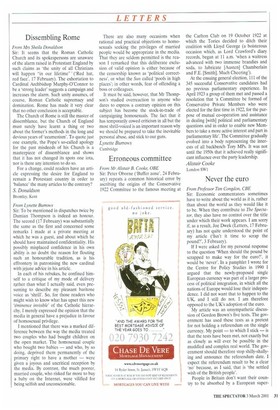Dissembling Rome
From Mrs Sheila Donaldson Sir: It seems that the Roman Catholic Church and its spokespersons are unaware of the alarm raised in Protestant England by such claims as 'the unity of all Christians will happen "in our lifetime" ' (`Red hat, red face', 17 February). The exhortation to Cardinal Archbishop Murphy-O'Connor to be a 'strong leader' suggests a campaign and increases the alarm. Such unity assumes, of course, Roman Catholic supremacy and domination. Rome has made it very clear that no other conclusion is acceptable.
The Church of Rome is still the master of dissemblance, but the Church of England must surely have learnt a thing or two about the former's methods in the long and devious years of 'ecumenism'. To quote just one example, the Pope's so-called apology for the past misdeeds of his Church is a masterpiece of dissemblance and shows that it has not changed its spots one iota, nor is there any intention to do so.
For a change, could readers have an article expressing the desire for England to remain a Protestant country in order to 'balance' the many articles to the contrary?
S. Donaldson
Bromley, Kent
From Lynette Burrows Sir: To be mentioned in dispatches twice by Damian Thompson is indeed an honour. The second (17 February) was substantially the same as the first and concerned some remarks I made at a private meeting at which he was a guest, and about which he should have maintained confidentiality. His possibly misplaced confidence in his own ability is no doubt the reason for flouting such an honourable tradition, as is his effrontery in patronising the new cardinal with jejune advice in his article.
In each of his rebukes, he confined himself to a critique of my mode of delivery rather than what I actually said, even presuming to describe my pleasant baritone voice as 'shrill'. So, for those readers who might wish to know what has upset this new 'eminence invisible' of the Catholic hierarchy, I merely expressed the opinion that the media in general have a prejudice in favour of homosexual privilege.
I mentioned that there was a marked difference between the way the media treated two couples who had bought children on the open market. The homosexual couple who bought two babies — and who, by so doing, deprived them permanently of the primary right to have a mother — were given a joyous and uncritical reception by the media. By contrast, the much poorer, married couple, who risked far more to buy a baby on the Internet, were vilified for being selfish and unconscionable.
There are also many occasions when rational and practical objections to homosexuals seeking the privileges of married people would be appropriate in the media. That they are seldom permitted is the reason I remarked that this deliberate exclusion of valid opinion is either because of the censorship known as 'political correctness', or what the Sun called `poofs in high places'; in other words, fear of offending a boss or colleagues.
It must be said, however, that Mr Thompson's studied overreaction to anyone who dares to express a contrary opinion on this subject has become the stock-in-trade of campaigning homosexuals. The fact that it has temporarily cowed criticism in all but the most shrill-voiced is an important reason why we should be prepared to take the inevitable personal abuse, and stick to our guns.
Lynette Burrows
Cambridge












































































 Previous page
Previous page